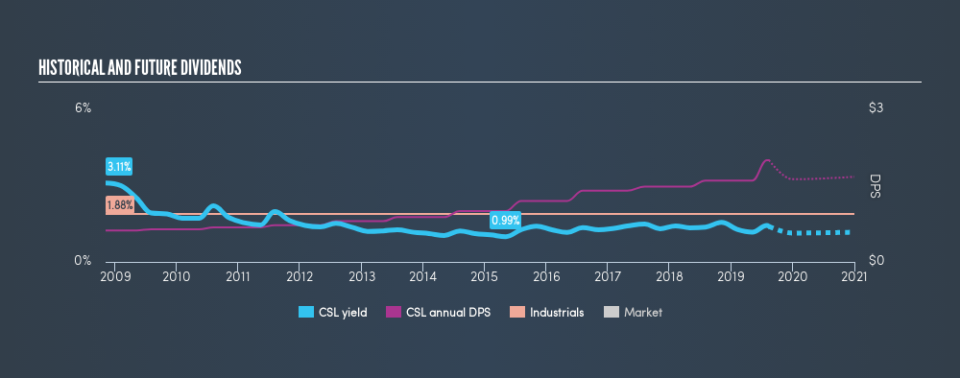Is It Smart To Buy Carlisle Companies Incorporated (NYSE:CSL) Before It Goes Ex-Dividend?

Regular readers will know that we love our dividends at Simply Wall St, which is why it's exciting to see Carlisle Companies Incorporated (NYSE:CSL) is about to trade ex-dividend in the next 4 days. Ex-dividend means that investors that purchase the stock on or after the 19th of August will not receive this dividend, which will be paid on the 3rd of September.
Carlisle Companies's next dividend payment will be US$0.50 per share. Last year, in total, the company distributed US$2.00 to shareholders. Looking at the last 12 months of distributions, Carlisle Companies has a trailing yield of approximately 1.4% on its current stock price of $143.21. Dividends are an important source of income to many shareholders, but the health of the business is crucial to maintaining those dividends. We need to see whether the dividend is covered by earnings and if it's growing.
See our latest analysis for Carlisle Companies
Dividends are usually paid out of company profits, so if a company pays out more than it earned then its dividend is usually at greater risk of being cut. Carlisle Companies has a low and conservative payout ratio of just 22% of its income after tax. Yet cash flow is typically more important than profit for assessing dividend sustainability, so we should always check if the company generated enough cash to afford its dividend. Luckily it paid out just 21% of its free cash flow last year.
It's positive to see that Carlisle Companies's dividend is covered by both profits and cash flow, since this is generally a sign that the dividend is sustainable, and a lower payout ratio usually suggests a greater margin of safety before the dividend gets cut.
Click here to see the company's payout ratio, plus analyst estimates of its future dividends.
Have Earnings And Dividends Been Growing?
Businesses with strong growth prospects usually make the best dividend payers, because it's easier to grow dividends when earnings per share are improving. Investors love dividends, so if earnings fall and the dividend is reduced, expect a stock to be sold off heavily at the same time. Fortunately for readers, Carlisle Companies's earnings per share have been growing at 14% a year for the past five years. Earnings per share are growing rapidly and the company is keeping more than half of its earnings within the business; an attractive combination which could suggest the company is focused on reinvesting to grow earnings further. Fast-growing businesses that are reinvesting heavily are enticing from a dividend perspective, especially since they can often increase the payout ratio later.
Many investors will assess a company's dividend performance by evaluating how much the dividend payments have changed over time. In the last 10 years, Carlisle Companies has lifted its dividend by approximately 12% a year on average. It's great to see earnings per share growing rapidly over several years, and dividends per share growing right along with it.
The Bottom Line
Should investors buy Carlisle Companies for the upcoming dividend? Carlisle Companies has been growing earnings at a rapid rate, and has a conservatively low payout ratio, implying that it is reinvesting heavily in its business; a sterling combination. It's a promising combination that should mark this company worthy of closer attention.
Wondering what the future holds for Carlisle Companies? See what the six analysts we track are forecasting, with this visualisation of its historical and future estimated earnings and cash flow
A common investment mistake is buying the first interesting stock you see. Here you can find a list of promising dividend stocks with a greater than 2% yield and an upcoming dividend.
We aim to bring you long-term focused research analysis driven by fundamental data. Note that our analysis may not factor in the latest price-sensitive company announcements or qualitative material.
If you spot an error that warrants correction, please contact the editor at editorial-team@simplywallst.com. This article by Simply Wall St is general in nature. It does not constitute a recommendation to buy or sell any stock, and does not take account of your objectives, or your financial situation. Simply Wall St has no position in the stocks mentioned. Thank you for reading.

